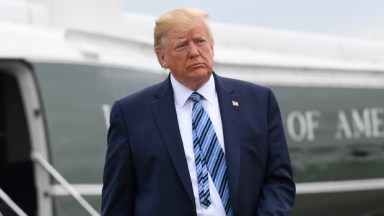
Despite his assurances that he wouldn’t touch LGBTQ workplace protection laws at the beginning of his presidency, Donald Trump has formally proposed a new Labor Department rule that would allow businesses with federal contracts to cite religious objections as a legal way to discriminate against employees. The legal discrimination includes on the basis of LGBTQ identity, race, sex, national origin, ethnicity, and other characteristics. Learn more about the Trump administration’s draft rule, and how it could affect workers like you:
1. Businesses with federal contracts would be able to cite religious objections as a valid reason to discriminate against employees. Citing religious reasons, the business could legally fire, demote, or discriminate against an employee on the basis of race, ethnicity, national origin, sex, LGBTQ status, among other things. Corporations, schools, and societies are also protected, provided they claim they have a “religious purpose,” according to the draft rule. It also states that the organization doesn’t need to be entirely religious. “The contractor must be organized for a religious purpose, meaning that it was conceived with a self-identified religious purpose. This need not be the contractor’s only purpose,” according to the proposal. “A religious purpose can be shown by articles of incorporation or other founding documents, but that is not the only type of evidence that can be used.” Instead, the business can say that faith/morals guide them.
The proposal would apply to up to 420,000 contractors, according to a notice from the Federal Register, per Buzzfeed News: “While only a subset of contractors and would-be contractors may wish to seek this exemption, the Supreme Court, Congress, and the President have each affirmed the importance of protecting religious liberty for those organizations who wish to exercise it.”
2. The National Center for Transgender Equality said in a statement the rule could allow “firing or refusing to hire someone because of their sexual orientation or gender identity. It could also lead to federal contractors refusing to hire women or unmarried workers who are pregnant or parents, or even discrimination on the basis of race.”
3. The proposal rolls back the policies of past presidencies. President Lyndon B. Johnson banned discrimination in the workplace by executive order in 1965. President George W. Bush added a small religious exemption during his administration that allows religious corporations make employment decisions based on their faith. Obama expanded Johnson’s order to also protect LGBTQ people working for federal contractors.
4. This comes despite Trump vowing in January 2017 to leave former President Barack Obama’s LGBT workplace protections intact. Days after his inauguration, the Trump administration released a statement denying the rumor that the president would sign an executive order rolling back lesbian, gay, bisexual and transgender rights: “President Donald J. Trump is determined to protect the rights of all Americans, including the LGBTQ community. President Trump continues to be respectful and supportive of LGBTQ rights, just as he was throughout the election,” read the statement from the White House Office of the Press Secretary. “The President is proud to have been the first ever GOP nominee to mention the LGBTQ community in his nomination acceptance speech, pledging then to protect the community from violence and oppression. The executive order signed in 2014, which protects employees from anti-LGBTQ workplace discrimination while working for federal contractors, will remain intact at the direction of President Donald J. Trump.”
5. The ACLU protested the proposal in a written statement: “Once again, the Trump administration is shamefully working to license taxpayer-funded discrimination in the name of religion,” Ian Thompson, senior legislative counsel for the American Civil Liberties Union said in the statement. “Nearly one-quarter of the employees in the U.S. work for an employer that has a contract with the federal government. We will work to stop this rule that seeks to undermine our civil rights protections and encourages discrimination in the workplace.”
You can read the Labor Department’s full, 46-page draft rule HERE.


